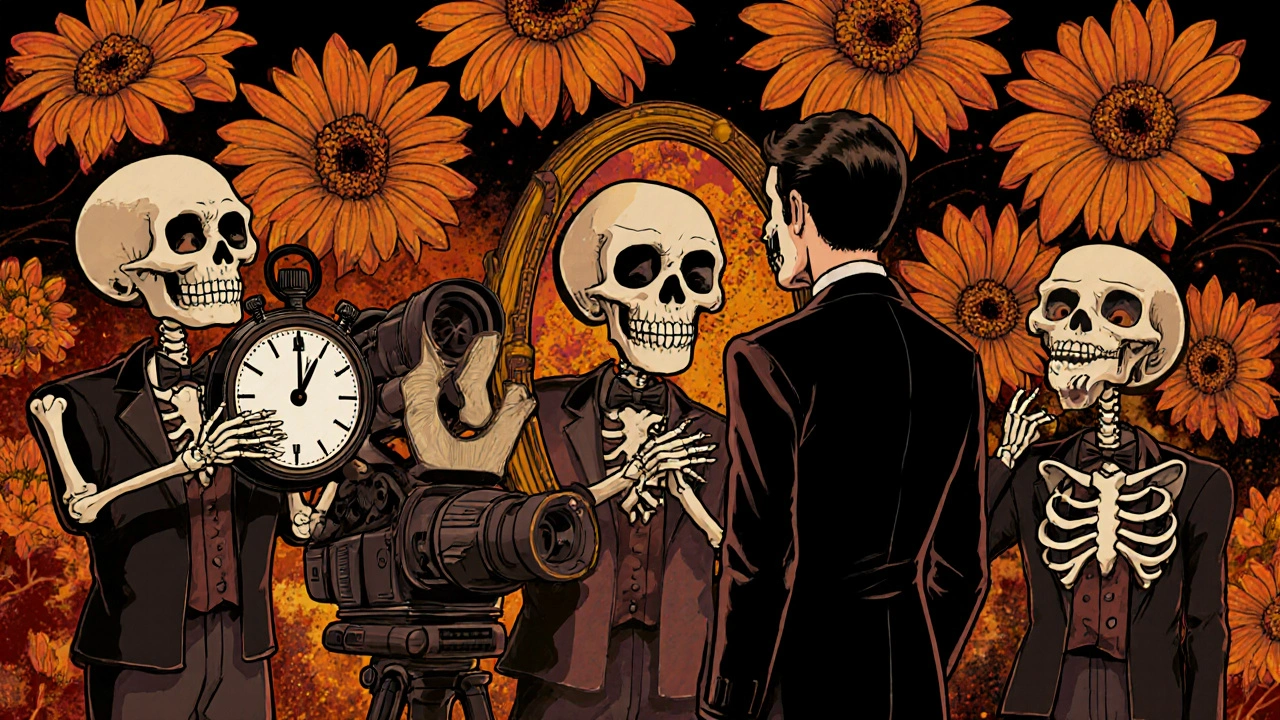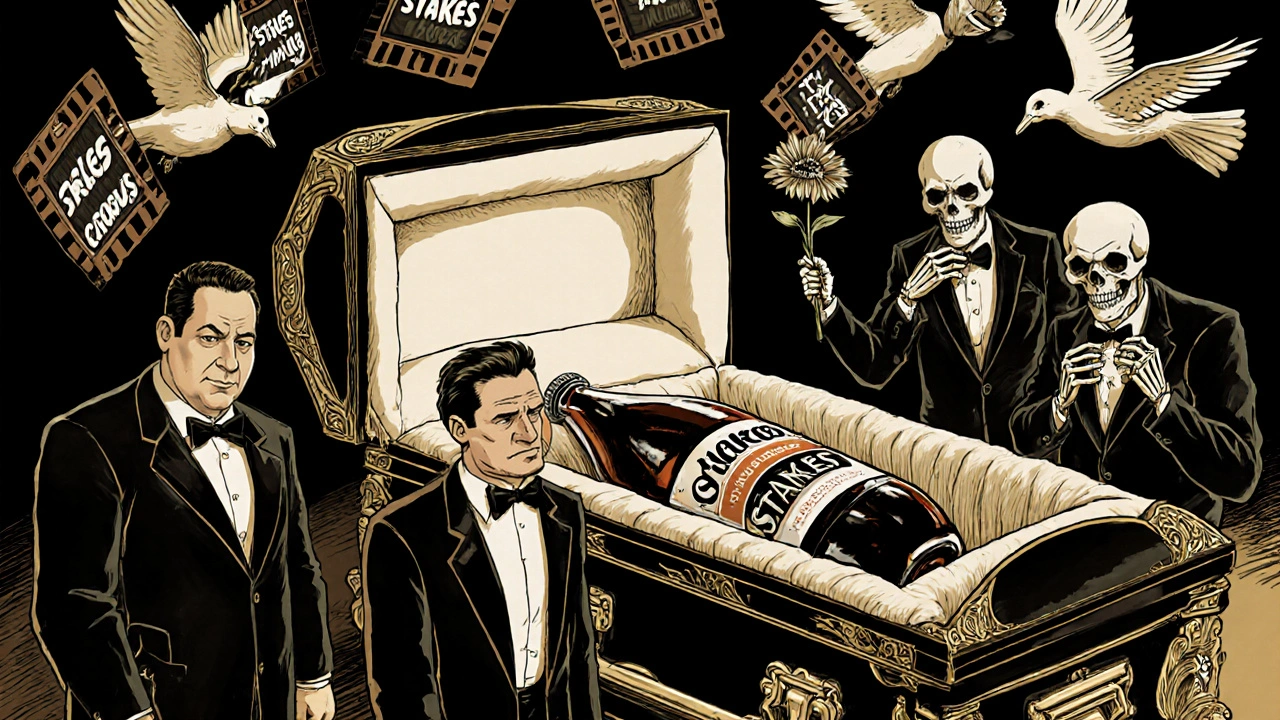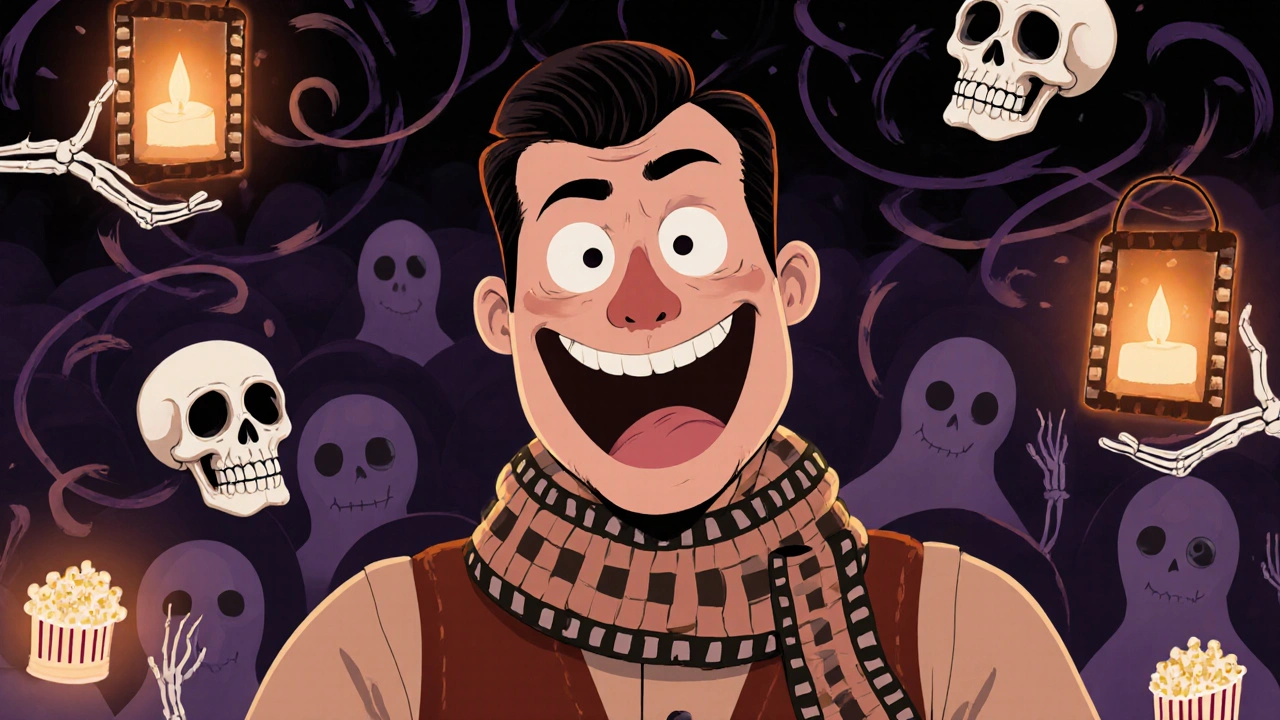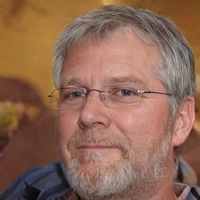Great comedy on film doesn’t happen because an actor is funny. It happens because they understand timing, reactions, and stakes-three invisible pillars that hold up every laugh. Think about the last scene that made you spit out your soda. Was it the punchline? Probably not. It was the millisecond before the punchline, when the actor’s eyes flickered, their breath caught, or their shoulder twitched just enough to tell you they were about to lose it. That’s the real magic.
Timing Is Everything-Even When Nothing Is Said
Comedy timing isn’t about speed. It’s about rhythm. It’s the pause after a line that makes the audience lean in. It’s the beat before the slapstick fall that makes you hold your breath. In Anchorman, when Ron Burgundy says, "I’m in a glass case of emotion," the laugh doesn’t come from the words. It comes from the silence that follows. Will Ferrell doesn’t rush it. He lets the absurdity sink in. That pause is longer than most movie scenes.
Studies of audience laughter in film screenings show that the most effective comedic pauses last between 1.2 and 1.8 seconds. Too short, and the joke feels rushed. Too long, and the tension breaks. Great comic actors don’t count in their heads. They feel it. They know when the room is ready. In Little Miss Sunshine, Steve Carell’s silent stare into the mirror after his character’s breakdown isn’t played for sympathy. It’s played for the quiet, uncomfortable laugh that comes when you recognize yourself in someone else’s unraveling.
Timing also lives in the edit. A great comic actor gives the editor room to breathe. They don’t overplay. They don’t force the laugh. They deliver the line, then get out of the way. That’s why actors like Jackie Chan or Buster Keaton could do physical comedy without sound. Their timing was so precise, the audience laughed at the space between movements.
Reactions Are the Real Punchline
Most actors think comedy is about delivering lines with flair. The best ones know it’s about reacting to nonsense like it’s normal. In The Office (U.S. version), Steve Carell’s Michael Scott is the joke-but the real comedy comes from the people around him. Jenna Fischer’s Pam, with her deadpan eyebrow raise, or John Krasinski’s Jim, with that slow, knowing smirk, turn every awkward moment into gold.
Comedic reactions aren’t exaggerated. They’re restrained. Think of Paul Giamatti in Barney’s Version. When he hears his wife’s confession, he doesn’t scream. He doesn’t cry. He just sits there, slowly lowering his fork. The camera holds on his face for seven seconds. That’s when the audience loses it-not because something dramatic happened, but because nothing did. The reaction was human. And that’s terrifyingly funny.
Watch how Judi Dench reacts in Philomena. She’s not playing a comedy, but there’s a scene where she hears a ridiculous political statement and just… blinks. Once. Twice. That’s it. No smirk. No nod. Just two slow blinks. The laugh comes from the audience realizing: she’s the only sane person in the room. That’s the power of a perfectly timed reaction.
Great comic actors train their faces like musicians train their fingers. They know exactly how much of a twitch, how long of a stare, how slight of a head tilt can turn a simple glance into a punchline. That’s why actors like Carol Burnett or Rowan Atkinson became legends-they could make silence scream.
Stakes Make the Funny Matter
There’s a reason you laugh harder at a character who’s about to lose their job than at one who’s just spilling coffee. Comedy needs consequences. If there’s no risk, there’s no relief-and no real laugh.
In Borat, Sacha Baron Cohen’s character is ridiculous. But the comedy works because he’s not just being weird-he’s trying to win a prize. He’s trying to impress a TV producer. He’s trying to get his daughter married. The higher the stakes, the more desperate he becomes, and the funnier his failures feel.
Same with Superbad. The whole movie is about two teens trying to get alcohol so they can impress girls. The plot is simple. But the stakes feel real. They’re not just drinking to party-they’re trying to prove they’re not losers. That’s why the scene where they accidentally get arrested doesn’t just feel chaotic. It feels tragic. And that’s why it’s hilarious.
Even in slapstick, stakes matter. In Modern Times, Charlie Chaplin’s character is trying to survive an industrial system that’s crushing him. The gags aren’t random. They’re the result of a man fighting to stay upright in a world designed to knock him down. The laughter isn’t at his expense-it’s because we recognize how hard he’s trying.
Without stakes, comedy becomes just noise. With stakes, it becomes truth. And truth, no matter how absurd, always lands.

How Real Actors Train for This
Most acting schools teach drama first. Comedy? They assume you’re either born with it or you’re not. That’s wrong.
Actors who specialize in comedy spend hours watching silent films. Not for nostalgia-because silent film actors had to communicate everything without words. They studied Keaton’s body control, Lloyd’s timing, and Chaplin’s emotional depth. They learned that a stumble isn’t funny unless the character thinks they’re still in control.
They also do improv drills. Not just "yes, and..."-but "what if this went wrong?" One exercise: act out a serious scene-like a funeral-while your scene partner keeps giving you ridiculous information. The goal isn’t to be funny. It’s to stay grounded while the world around you collapses. That’s how you learn to react.
And they rehearse pauses. Not with a metronome, but with a stopwatch and a camera. They record themselves delivering a line, then play it back. They cut 0.3 seconds off the pause. Then 0.2. Then they add it back. They find the sweet spot where the audience’s brain catches up.
It’s not magic. It’s math. And muscle memory.
What Doesn’t Work in Comedy Acting
Overacting is the biggest killer of comedy. If an actor is trying too hard to be funny, the audience checks out. They feel manipulated. That’s why so many sitcoms from the 90s feel dated now. The actors were screaming their lines, flailing their arms, and winking at the camera. It wasn’t comedy. It was performance.
Another mistake? Ignoring the environment. Comedy doesn’t happen in a vacuum. A great comic actor uses space. They use props. They use silence. They use the other actors. In What We Do in the Shadows, the vampires’ awkward attempts to act normal work because the set is real-the furniture, the lighting, the clutter. The absurdity lives in the mundane.
And never forget: comedy needs truth. You can’t fake a reaction. If an actor doesn’t believe their character’s panic, the audience won’t either. That’s why actors like Tina Fey and Amy Poehler are so good-they’re not pretending to be awkward. They’re remembering what it felt like to be awkward.

Why This Matters Beyond Comedy
Understanding these three elements-timing, reactions, stakes-doesn’t just help you appreciate comedy. It helps you understand every kind of performance.
Think about dramatic actors like Daniel Day-Lewis. His power comes from how he holds back. He doesn’t shout in grief. He lets the silence do the work. That’s comic timing applied to tragedy.
Think about how politicians use pauses. A well-timed silence can make a lie sound like a revelation. A raised eyebrow can make a policy sound ridiculous. That’s comedy technique in real life.
Even in business, timing matters. A well-placed joke in a presentation can break tension. A thoughtful pause after bad news can make the audience feel heard. Reacting calmly under pressure? That’s the same skill.
Comedy acting isn’t about being silly. It’s about being human. And that’s why it lasts.
Can anyone learn comedy acting, or is it a natural talent?
Anyone can learn the tools of comedy acting-timing, reactions, and stakes-but it takes practice, not just innate humor. The best comic actors didn’t start out funny. They trained. They watched, repeated, and refined. Like playing an instrument, it’s about muscle memory and observation. Natural charisma helps, but discipline makes it work on screen.
Why do some funny lines fall flat in movies?
A line falls flat when the actor doesn’t sell the context. If the stakes aren’t clear, the audience doesn’t care. If the timing is rushed, the joke doesn’t land. If the reaction is fake, the moment feels hollow. Even the funniest script can die if the performance doesn’t support it. Comedy lives in the details, not the dialogue.
Do comedians need to be funny in real life?
No. Many of the best comic actors are quiet, serious, or even shy off-camera. Jim Carrey was intense and introspective between takes. Steve Carell is known for being calm and thoughtful. Their ability to embody absurdity doesn’t come from being a party clown-it comes from understanding human behavior deeply. Comedy acting is about truth, not personality.
What’s the difference between stage comedy and film comedy?
Stage comedy relies on projection and broad gestures because the audience is far away. Film comedy lives in the small: a blink, a lip twitch, a shift in weight. A stage actor might throw their arms wide to signal surprise. A film actor just lets their eyes widen for half a second. Film also allows editing and multiple takes-so timing can be perfected frame by frame. Stage is live. Film is sculpted.
How do directors help actors nail comedic timing?
Good directors don’t tell actors to "be funnier." They create space. They might say, "Wait three seconds after she says that," or "Look at the floor, not at her." They use silence as a tool. They might shoot multiple versions of a scene-one fast, one slow, one with no reaction-then pick the one that breathes naturally. The best directors act like editors before the edit even begins.
Final Thought: Comedy Is the Hardest Kind of Acting
It’s easier to make someone cry than to make them laugh. Tears are raw. Laughter is fragile. One wrong breath, one misplaced glance, and the whole moment collapses. That’s why the best comic actors are the most disciplined. They don’t rely on jokes. They rely on truth. They don’t chase laughs. They earn them-through precision, patience, and a deep understanding of what it means to be human in a world that doesn’t always make sense.


